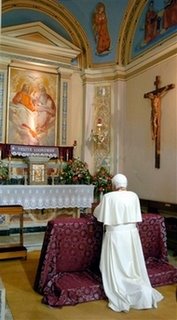Pope St. Alexander I was the sixth Pope of the Catholic Church from c. 108 - c. 119 AD. Most of the information on Pope St. Alexander I is not guaranteed completely accurate. What we do know about him is that he inserted words of institution for the Eucharist in the Canon of the Mass. These words are the ones like such: "The day that He suffered, He took bread into His sacred and venerable hands and lifting the bread to You, His Almighty Father, He gave thanks, blessed it, broke it, and gave it to His disciples and said 'Take this, this is my Body..."
He is also attributed to have introduced the use of water mixed with salt to bless homes. He is said to have been martyred by decapitation on the Via Nomentana in Rome. His remains initially rested in the catacombs on the Via Nomentana but were eventually brought to the basilica of Santa Sabina by Pope Pascal I
by Pope Pascal I (817-824).
(817-824).
Under Emperor Hadrian, in A.D. 117, Pope Alexander I suffered martyrdom, together with the priests Eventius and Theodulus. Juvenal, bishop of Narni, was executed on May 3, A.D. 377. His Feastday is May 3rd where he and his companions are commemorated in the Mass.
Read more >>
He is also attributed to have introduced the use of water mixed with salt to bless homes. He is said to have been martyred by decapitation on the Via Nomentana in Rome. His remains initially rested in the catacombs on the Via Nomentana but were eventually brought to the basilica of Santa Sabina
Under Emperor Hadrian, in A.D. 117, Pope Alexander I suffered martyrdom, together with the priests Eventius and Theodulus. Juvenal, bishop of Narni, was executed on May 3, A.D. 377. His Feastday is May 3rd where he and his companions are commemorated in the Mass.
Traditional Matins Reading:
Alexander, who was born at Rome, governed the Church during the reign of the emperor Adrian, and converted a great portion of the Roman nobles to Christ. He decreed that only bread and wine should be offered in the Mass, but that water should be mingled with the wine, in memory of the Blood and Water which flowed from the Side of Christ Jesus. He added to the Canon of the Mass these words: Qui pridie quam pateretur. He also decreed that Holy Water, with salt in it, should always be kept in the church, and that it should be used in the dwellings of the faithful for the purpose of driving away evil spirits. He governed the Church ten years, five months, and twenty days. He was illustrious for the holiness of his life and for the useful laws which he made. He was crowned with martyrdom together with the priests Eventius and Theodulus, and was buried on the Nomen tan Way, three miles out of Rome, on the very spot where he had been beheaded. He ordained, in the December of various years, six priests, two deacons, and five for divers places The bodies of these Saints were afterwards translated to the Church of Saint Sabina in Rome. On this same day occurred the death of blessed Juvenal, bishop of Narni, who, after having, by his learning and virtue, converted many persons of that city to Christ, and being celebrated for the miracles he wrought, slept in peace, and was honourably buried in the same city.
Collect:
O Almighty God, today we are celebrating the birthday of Your saints Alexander, Eventius, Theodulus, and Juvenal. Hear their prayers and rescue us from all the dangers that threaten us. Through Our Lord . . .
Collect:
O Almighty God, today we are celebrating the birthday of Your saints Alexander, Eventius, Theodulus, and Juvenal. Hear their prayers and rescue us from all the dangers that threaten us. Through Our Lord . . .
















